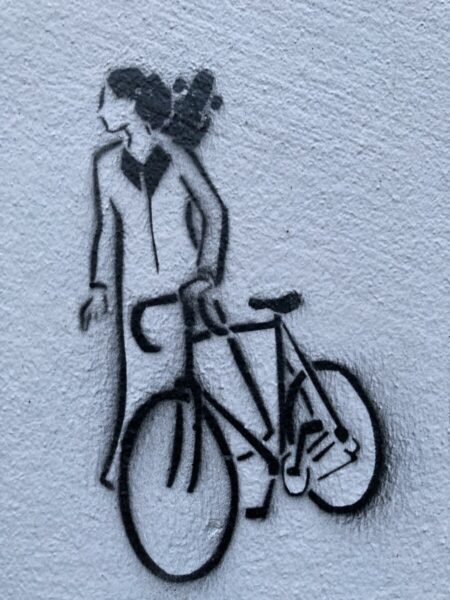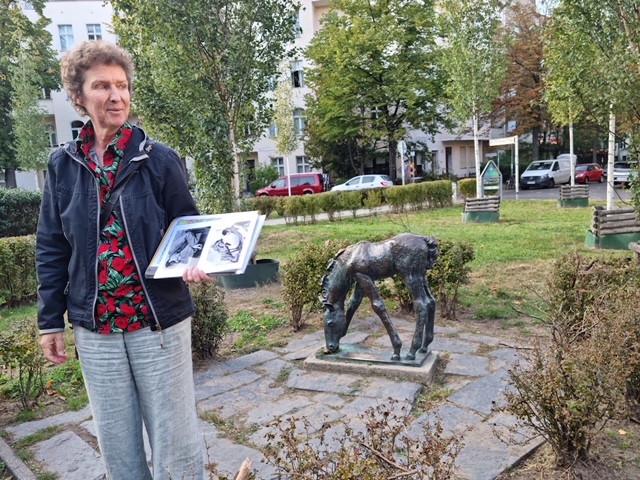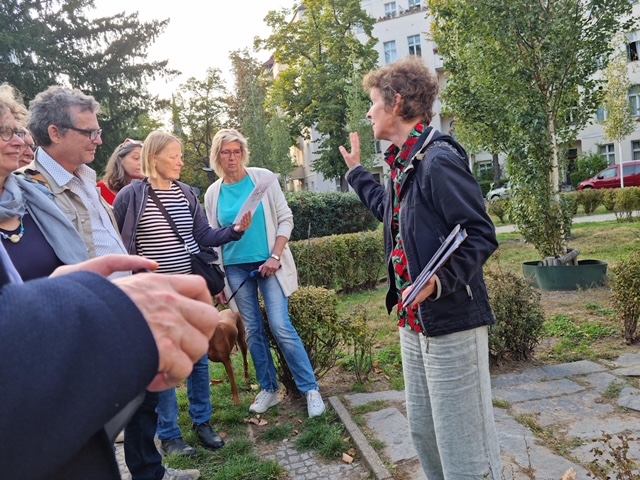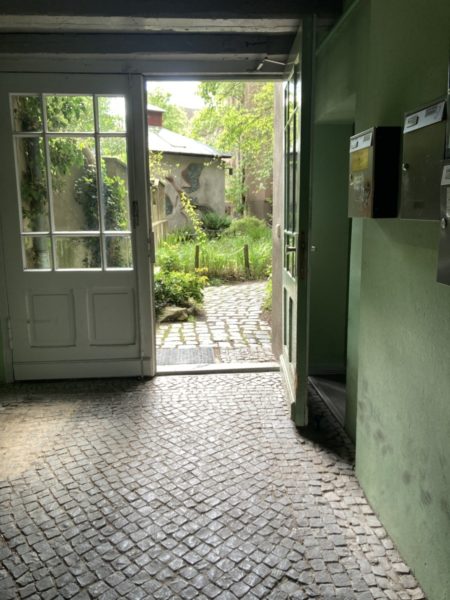
Berlin skys late autumn/early winter: weather is nice, not too cold!


Berlin skys late autumn/early winter: weather is nice, not too cold!

https://www.berlin.de/tourismus/parks-und-gaerten/5062586-1740419-naturpark-suedgelaende.html

Guided berlinsights.de Tour through Friedenau
When people move, after a decade in Berlin, they tend to leave a suitcase: at least one full of memories shared at places that may seem funny and sad, at the same time.


One such spot is the so-called ‘Geisterhaus” at Stubenrauch street where we took-off one late September: a fabulous building known as ‘ghosts’ place’ today is silent since long, despite Berlin’s ban against misuse on living space (2014)  .
.
We pass most splendid Jugendstil houses just to realize that our Berlinale bear stems from female sculptor Renee Sintenis who managed to survive NS times in the same neigbourhood: a square is named after her, best described by Berlin journalist Maritta Tkalec with her splendid collection of the City of Berlin along 60 Objects.
Reminiscences of real estate magnate Haberland at Rüdesheimer Platz, public toilets from ancient times, and fountain of Siegfried alluding to Rhine wine valleys and Garden Terace City let us pass by late Guenter Grass and Uwe-Johnson-Salon with living artists thanks to Christa Moog’s Literature Hotel at Fregestr.68. We only get a glimpse of past Jewish prayer room near Stolperstein Initiative Stierstr 21, and we forgot to think of ‘Papa’ Heuss, Germany’s 1st President ever. So we glance at least at the Valide-i Sultan Mosque at Hedwig street, only to remind us of colonial times at http://www.alte-bahnhofshalle.de.
… source: Der Spiegel, 20.09.2023.
source: Der Spiegel, 20.09.2023.
Within two hours, eleven minutes and 53 seconds, 29-year-young Tigis has become the 1st woman ever to make that 42 km distance faster than anyone else among some 48000 participants from more than 150 countries. The police was at least as quick on the same avenue June 17 by stoping clima activists’ efforts to seal and block the event by gluing themselves on that spot. Congrats to ETHIOPIA says https://berlinsights.de!
 Looking at the Berlin Art Week 2023 in autumn, we see the Rose is a Rose is .. Isa Genzken at the New National Gallery near Cultural Forum, Philharmony and Potsdamer Platz. As Isa Genzken said in an interview back in 2016:
‘Nothing is fixed or two- dimensional but rather cinematic’,
and this has been the case with the art screened during that week.
Looking at the Berlin Art Week 2023 in autumn, we see the Rose is a Rose is .. Isa Genzken at the New National Gallery near Cultural Forum, Philharmony and Potsdamer Platz. As Isa Genzken said in an interview back in 2016:
‘Nothing is fixed or two- dimensional but rather cinematic’,
and this has been the case with the art screened during that week. https://www.flucht-vertreibung-versoehnung.de/en/home
Nikita inspired us at https://www.visitberlin.de/en/event/long-night-museums-2023 with his sounds near the ‘room of silence’, letting us feel enlightened by how creation is fostered by sorrow and silence: thank you Nikita from Russia, having left your home to live refreshed in free movement here in D – Berlin.
 Source: https://nikitazhukovskiy.com
Source: https://nikitazhukovskiy.com


Summer in Mittenwald! With fresco paintings, the so-called ‘Lueftlmalerei’, see https://www.alpenwelt-karwendel.de/e-themenfuehrung-lueftlmalerei-mit-regine-ronge, the visit to Karwendel mountain and Murnau area is worth a real summer vacation: sip a cup of tea in-between…
 berlinsights.de 14 July 2023: BEGINENHOF, D-10999 Berlin Kreuzberg with Sohel Rahman and his documentary The Ice cream Sellers https://www.youtube.com/watch?v=bgVESYILtQg: some 20 co-owners and as many visitors enjoyed great dinner prepared by Sohel himself, and attended the film screening of his award-winning creative documentary ‘The ICECREAM SELLERS’. The ‘rural’ view of the largest refugee camp of one million people living, giving birth, generating income and sustaining – evoke my attention when witnessing the screening and discussion at Heinrich Böll Foundation (June 23, 2023). I was amazed, since I had been in the camp on behalf of UNHCR some ten years ago, before the 2017 (2nd) genocide of the Muslim Rohingya community let the Rohingya Muslim community take refuge again. This stalemate situation does not allow forgetting facts that had emerged as early as 1970 under the former military regime of Burma, now Myanmar. We can do more – let us discuss! Contact Susanne +49 151 17861960
berlinsights.de 14 July 2023: BEGINENHOF, D-10999 Berlin Kreuzberg with Sohel Rahman and his documentary The Ice cream Sellers https://www.youtube.com/watch?v=bgVESYILtQg: some 20 co-owners and as many visitors enjoyed great dinner prepared by Sohel himself, and attended the film screening of his award-winning creative documentary ‘The ICECREAM SELLERS’. The ‘rural’ view of the largest refugee camp of one million people living, giving birth, generating income and sustaining – evoke my attention when witnessing the screening and discussion at Heinrich Böll Foundation (June 23, 2023). I was amazed, since I had been in the camp on behalf of UNHCR some ten years ago, before the 2017 (2nd) genocide of the Muslim Rohingya community let the Rohingya Muslim community take refuge again. This stalemate situation does not allow forgetting facts that had emerged as early as 1970 under the former military regime of Burma, now Myanmar. We can do more – let us discuss! Contact Susanne +49 151 17861960




Manga and Fantasy crowds, literature dates and conversations all around: wonderful book fair among diverse female and other futures … :-)
You are currently viewing a placeholder content from Facebook. To access the actual content, click the button below. Please note that doing so will share data with third-party providers.
More InformationYou are currently viewing a placeholder content from Instagram. To access the actual content, click the button below. Please note that doing so will share data with third-party providers.
More InformationYou are currently viewing a placeholder content from X. To access the actual content, click the button below. Please note that doing so will share data with third-party providers.
More Information